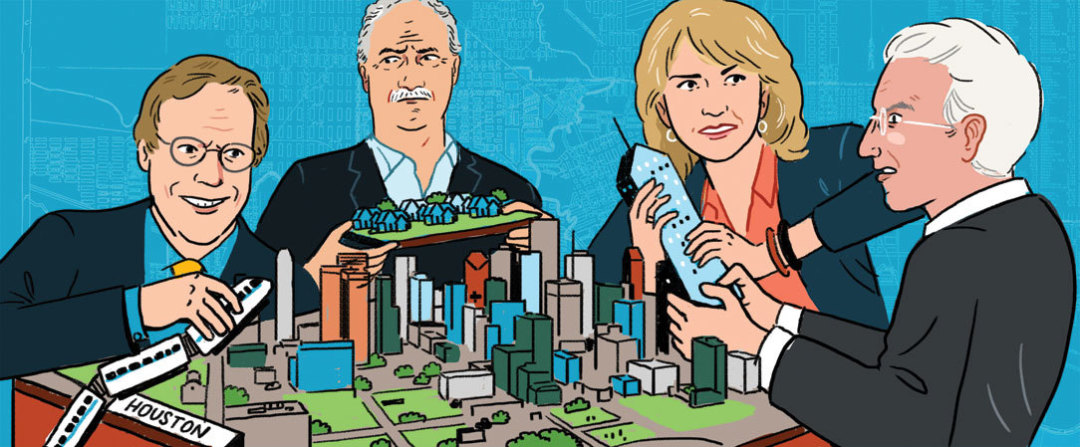Cornering the Futures Market

The economic tide may be turning, the sun setting on our Houston Miracle, but fascination with what makes this city unique (and what will keep it thus) shows no signs of dying down. Why, hardly a day goes by when someone isn’t sitting around thinking about starting up a think tank so people might sit around thinking about protecting and preserving our special specialness.
Which brings us to the Center for Opportunity Urbanism, launched in January by Joel Kotkin, an authority on big-picture demographic issues, as well as noted public transportation thinker Wendell Cox and Houston urban planning theorist Tory Gattis. Kotkin in particular has always interested us, not least because he has written about H-Town often and admiringly for the national media, in spite of (because of?) not having lived here. (One wonders how all this evangelizing sits with the residents of Orange County, where Kotkin teaches and serves on the editorial board of the local paper.) Anyway, the COU regularly extols such things as our lack of zoning, unrestricted housing supply, diversified economy, social mobility—and complete and utter reliance on the automobile.
Needless to say, there are other Bayou City brains with opposing views, contrarians who share nothing but a belief in Houston’s greatness. Having read Team of Rivals, we are all for encouraging lively debate, on the idea that if vituperation was good enough for Lincoln during the Civil War, it can’t help but get us through our own rough patch. But how much disagreement is there really? Below, an in-the-tanks’-own-words guide to some of the bigger questions facing us.
Center for Opportunity Urbanism
Founded: 2015
Headed up by: Joel Kotkin
Is sprawl a bad thing? “Houston’s outward growth and congestion has already created demand for development inside the I-610 loop, which encompasses downtown and surrounding neighborhoods. Given this organic urbanization, master plans may be unnecessary, or even counterproductive.”
Should we spend more for mass transit? “Transit investments should be based in large part on serving cost-effectively those who most need it, to provide a reasonable alternative for those…for whom auto transit is difficult. It should not be primarily a vehicle for real estate speculation or indirect land use control.”
Urban core or suburbia? “People should have a range of neighborhood choices (including suburban), rather than being socially engineered into high-density, transit-oriented developments beloved by overly prescriptive planners.”
Should things be proceeding according to plans? “In general, cities are better off with more market-oriented land-use policies than prescriptive central planning.”
What's our employment outlook? “Successful economies need a broad spectrum of industries. Solid middle-class and blue-collar jobs are just as important as the much celebrated high-tech industries aimed at white-collar professionals.”
Kinder Institute for Urban Research
Founded: 2010
Headed up by: Bill Fulton (Stephen Klineberg co-directed the institute until 2014)
Is sprawl a bad thing? “If viable alternatives to car-centered sprawl are not made more widely available, much of the region’s remaining green spaces will disappear into highways, subdivisions, and parking lots.”
Should we spend more for mass transit? “Area residents who embrace the city’s automobile-dependent lifestyle are happier to be living here than those who want more transit-oriented choices.”
Urban core or suburbia? “The challenge today is not in finding people who would like to live in more compact, urbanized communities, but in building places across the region that can accommodate them.”
Should things be proceeding according to plans? “No zoning does not have to mean no planning.”
What's our employment outlook? “Houston has one of the strongest employment markets in the nation, but this includes large numbers of ‘poverty-level’ jobs that offer little opportunity for advancement.”
Houston Tomorrow
Founded: 1998
Headed up by: David Crossley
Is sprawl a bad thing? “The Houston region is poised to become a leader in transit and transit-oriented development—if we just don’t lose our nerve, and are able to think outside the traditional boxes about how to deliver service in a huge, diverse, polycentric metropolitan region.”
Should we spend more for mass transit? “There is no single service or mode that answers all issues; what we need is a seamless, connected system that combines multiple modes and levels of service.”
Urban core or suburbia? “Producing the kind of busy places that people love is not easy, particularly when public policy works to prevent it, as is often the case in Houston.”
Should things be proceeding according to plans? “Ultimately, transportation planning is urban planning. Transit is effective where jobs and population support it.”
What's our employment outlook? “Several of [Houston’s] trade centers have more jobs than downtown San Diego or Miami or San Antonio. Each is a ‘city’ in its own right.”
Center for Houston’s Future
Founded: 1992
Headed up by: Catherine Clark Mosbacher
Is sprawl a bad thing? “Grow as a series of urban centers, not as a continuous sprawl into the countryside. Focus future infrastructure in those urban centers, not to [sic] just any piece of land that can afford to create a municipal utility district.”
Should we spend more for mass transit? “A transportation network that links and supports the continued growth of the region’s livable growth centers and nodes is vital if the Houston region is to become a global city.”
Urban core or suburbia? “Encourage utilities districts that support the regional vision of a multicentric region with a series of urban centers and denser development in and near existing and proposed employment centers and transportation improvements.”
Should things be proceeding according to plans? “Diversity and the continual process of offering a good quality of life must include cogent planning for future transportation, utilities, and amenities.”
What's our employment outlook? “Although the Houston region has experienced phenomenal economic growth until now, its continued growth is not assured.”




